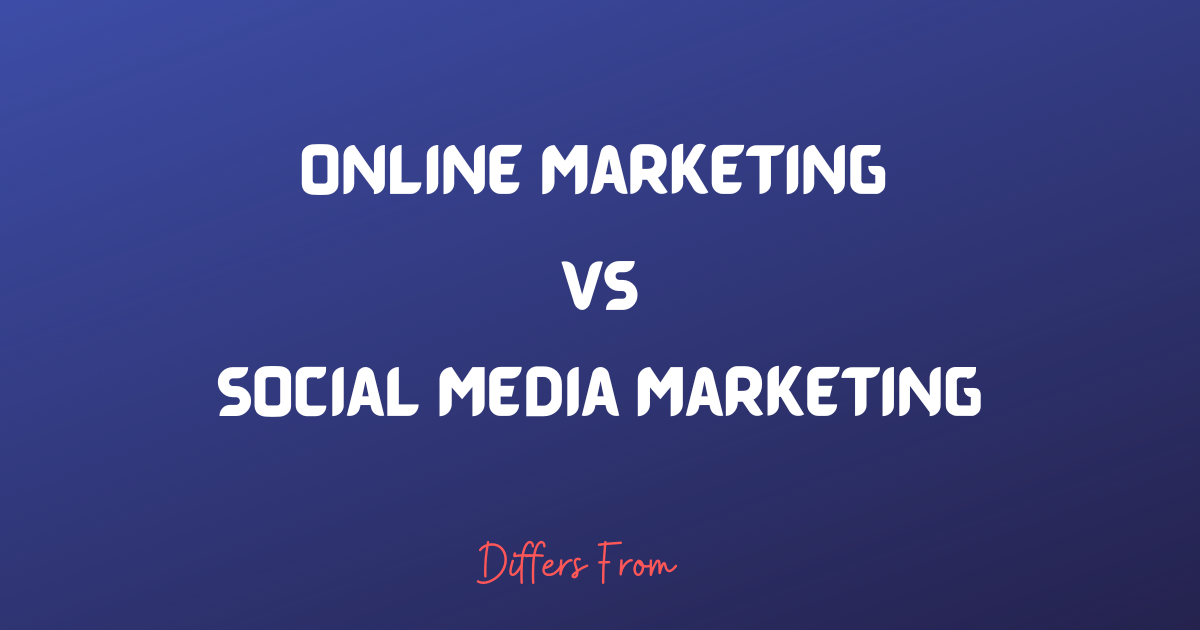In today’s digital landscape, businesses are faced with a myriad of marketing channels and strategies to reach their target audiences. Two of the most prominent approaches are online marketing and social media marketing. While these terms are often used interchangeably, they differ in significant ways. Understanding these differences is crucial for businesses to allocate their resources effectively and achieve their marketing goals.
Difference between online marketing and social media marketing
| Online Marketing | Social Media Marketing | |
| Objective | Focuses on promoting products or services through various online channels, including social media, email marketing, and paid advertising. | Aims to improve a website’s visibility on search engines, primarily focusing on organic (non-paid) search results. |
| Paid vs. Organic | Often involves paid advertising and promotions to reach a targeted audience quickly. | Primarily revolves around organic methods to enhance a website’s visibility, emphasizing content quality and relevance. |
| Time Sensitivity | Delivers quick results, making it suitable for time-sensitive campaigns or promotions. | Requires time and patience as it focuses on long-term, sustainable growth in organic search rankings. |
| Channels Utilized | Utilizes a variety of channels such as social media platforms, email newsletters, display ads, and influencer collaborations. | Primarily relies on optimizing website content, meta tags, and building quality backlinks to improve search engine rankings. |
| Cost Structure | Involves budget allocation for paid advertising, with costs varying based on the chosen platform and advertising model (e.g., pay-per-click). | Initial costs may include website optimization, content creation, and link building, with ongoing efforts focusing on organic growth. |
| Measurability | Offers immediate and trackable metrics, allowing businesses to analyze the success of campaigns in real-time. | Metrics, such as improved search rankings and organic traffic, may take time to manifest and require consistent monitoring. |
| Content Emphasis | Prioritizes creating persuasive and engaging content tailored for specific marketing channels and target audiences. | Emphasizes content quality, relevance, and usefulness to cater to both user needs and search engine algorithms. |
| Visibility Factors | Visibility is influenced by the budget allocated, ad quality, and bidding strategy on advertising platforms. | Visibility is earned through the creation of high-quality content, adherence to SEO best practices, and the acquisition of authoritative backlinks. |
| Flexibility | Offers the flexibility to adjust strategies and budgets quickly in response to changing market conditions. | Requires a more steady and consistent approach, with adjustments taking longer to manifest in search rankings. |
| Conversion Focus | Often geared towards immediate conversions and sales, with a direct call-to-action in marketing campaigns. | Focuses on building trust and authority over time, indirectly contributing to conversions through improved organic visibility and credibility. |
What is online marketing?
Online marketing, also known as internet marketing, encompasses a wide range of strategies and techniques implemented on the internet to promote products, services, or brands. It includes activities such as search engine optimization (SEO), email marketing, content marketing, pay-per-click (PPC) advertising, affiliate marketing, influencer marketing, and more. The goal of online marketing is to increase visibility, drive website traffic, generate leads, and ultimately achieve business growth and conversions in the digital realm.
Example: A clothing retailer implements an online marketing strategy that involves optimizing their website for relevant keywords, running pay-per-click campaigns on search engines, and collaborating with fashion influencers to promote their products.
What is social media marketing?
Social media marketing is a specialized form of online marketing that focuses on utilizing social media platforms to connect, engage, and communicate with target audiences. It involves creating and sharing unique content, fostering interactions, running targeted advertising campaigns, and leveraging the viral nature of social networks. The aim is to build brand awareness, drive website traffic, foster customer loyalty, and ultimately achieve business objectives through a strategic social media presence.
Example: A fitness brand leverages social media marketing by posting workout videos on Instagram, running sponsored posts to promote their apparel line, and engaging with their followers through comments and direct messages.
Comparison between online marketing and social media marketing
Online marketing encompasses a broader range of marketing activities conducted over the Internet, while social media marketing specifically leverages social media platforms for marketing purposes.
Social media marketing provides unique advantages such as targeted advertising options, real-time engagement, visual content formats, and potential for viral reach, while online marketing encompasses a wider array of strategies and channels beyond social media.
Scope
Online marketing: It covers a wide range of marketing activities conducted over the Internet, including search engine optimization (SEO), search engine marketing (SEM), email marketing, content marketing, affiliate marketing, influencer marketing, display advertising, and more.
Social media marketing: It is a subset of online marketing that specifically focuses on utilizing social media platforms for marketing purposes.
Platform
Online marketing: It encompasses various digital platforms and channels such as websites, search engines, blogs, email, mobile apps, online directories, and more.
Social media marketing: It primarily revolves around leveraging social media platforms like Facebook, Instagram, Twitter, LinkedIn, YouTube, Pinterest, and Snapchat.
Audience targeting
Online marketing: It employs a range of targeting methods, including demographic targeting, geographic targeting, keyword targeting, interest targeting, and behavioral targeting, to reach specific audiences across different online platforms.
Social media marketing: It utilizes similar targeting options as online marketing, but it emphasizes leveraging the user data and preferences available on social media platforms to refine the targeting process.
Social media platforms provide advanced targeting options based on demographics, interests, behaviors, and even specific interactions with the platform.
Content Format
Online marketing: It encompasses a wide variety of content formats such as website pages, blog articles, videos, infographics, whitepapers, eBooks, podcasts, webinars, and more.
Social media marketing: It predominantly relies on shorter and visually appealing content formats such as posts, images, videos, stories, live broadcasts, and polls. Each social media platform has its own unique content formats and limitations.
Engagement and interactivity
Online marketing: It aims to engage with audiences through various channels, such as website interactions, comments on blog posts, email responses, landing page forms, and more. However, the level of interactivity may vary depending on the specific online platform.
Social media marketing: It offers more direct interaction and engagement opportunities due to the social nature of the platforms.
Users can like, comment, share, retweet, and direct message businesses, providing a real-time and interactive experience.
Viral potential
Online marketing: It can generate viral content, but it relies on a wider range of channels and strategies to achieve the same level of virality as social media marketing.
Social media marketing: It has a higher potential for content to go viral due to the nature of social media platforms, where users can easily share and amplify content, leading to rapid dissemination and reach.
Community building and brand advocacy
Online marketing: It focuses on building a brand’s online presence, credibility, and reputation through various channels.
It may involve building an email subscriber list, establishing a blog readership, or nurturing an online community through forums or discussion boards.
Social media marketing: It provides a platform for businesses to actively engage with their audience, foster brand communities, and encourage brand advocacy.
Social media platforms facilitate conversations, user-generated content, and sharing, which can help in building a loyal and engaged community around a brand.
Conclusion
Online marketing encompasses various strategies conducted over the internet, while social media marketing focuses specifically on using social media platforms. Online marketing has a wider scope and utilizes diverse channels, while social media marketing centers around engagement on social media platforms.
FAQs
What is the difference between online marketing and social media marketing?
Online marketing refers to a broader range of marketing activities conducted over the Internet, including various strategies like SEO, SEM, email marketing, content marketing, etc.
Social media marketing, on the other hand, specifically focuses on using social media platforms for marketing purposes.
Which platforms are involved in online marketing?
Online marketing encompasses multiple platforms such as websites, search engines, blogs, email, mobile apps, online directories, and more.
What platforms are utilized in social media marketing?
Social media marketing revolves around popular social media platforms like Facebook, Instagram, Twitter, LinkedIn, YouTube, Pinterest, Snapchat, etc.
How do they differ in terms of content format?
Online marketing involves a wide range of content formats, including web pages, blog articles, videos, infographics, whitepapers, eBooks, podcasts, webinars, etc.
Social media marketing relies more on shorter and more visually appealing formats like posts, images, videos, stories, live broadcasts, and polls, tailored to suit specific social media platforms.

